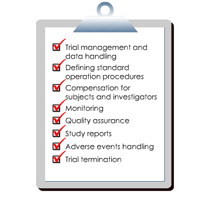GCP 1: Good Clinical Practice, Level 1
 |
|
2024 UPDATE:
This program is currently unavailable for enrollment.
It may have been updated or discontinued.
Check for newer version in our catalog.
This program is currently unavailable for enrollment.
It may have been updated or discontinued.
Check for newer version in our catalog.
.
Browse Our Catalog of 300+ Courses:
Catalog of CoursesEnroll into a Trial Course & Start Learning, Today:
Free Trial CoursesOutline:INTRODUCTION 1. Course Information 2. Interface Tour 3. Course Overview CLINICAL TRIAL OVERVIEW 4. Objectives 5. What is a Clinical Trial? 6. What is a Protocol? 7. What is Informed Consent? 8. Types and Phases 9. Benefits and Risks 10. Progress Check GCP GUIDELINES AND PRACTICE 11. Objectives 12. Choice of Control Group 13. Selection of Protocol 14. Protection of Subjects 15. Investigator`s Responsibilities 16. Sponsor`s Responsibilities 17. Record Keeping 18. Statistics and Calculations 19. Progress Check MONITORING AND ENFORCEMENT 20. Objectives 21. Monitoring 22. Regulations 23. Evaluation 24. Disqualification 25. Progress Check INSTITUTIONAL REVIEW BOARDS 26. Objectives 27. Purpose of IRBs 28. IRB Assurance 29. IRB Membership 30. IRB Regulations and Procedures 31. IRB Records and Reviews 32. Progress Check Informed Consent 33. Objectives 34. General Requirements 35. Informed Consent Process 36. Informative Elements 37. Types of Informed Consent 38. Progress Check | Objectives:Define the purpose of a clinical trial and the different types of clinical trials. Distinguish the four clinical study phases in terms of size, duration, and objectives. Explain why a study protocol is important. Define informed consent. List the questions that a prospective study participant must know the answers to before informed consent can be given. List the factors involved in the formulation of inclusion/exclusion criteria for participation in a clinical trial. Name the components of a trial protocol and the issues they should address. Describe the ways in which an ethics committee can ensure protection of the rights of human subjects during review of a clinical trial. Describe the responsibilities of the investigator in ensuring the safety of the study subjects. Describe the responsibilities of the sponsor in ensuring compliance with regulatory requirements. Name the factors to be considered in selecting study monitors. Know the regulations concerning the function of monitors and where they can be found in the Code of Federal Regulations. Describe the purpose of the monitor`s preinvestigation visit, periodic visits, and record reviews. Name the elements of an on-site visit record. Describe the grounds for disqualification of investigators from receiving investigational drugs or devices for testing. Describe the purpose of IRB review. Explain the assurance mechanisms and how the HHS and FDA implement them. Describe the regulations for maintaining diversity in IRB membership. Describe the general IRB procedures for standard review, expedited review, emergency use protocols, informed consent review, document review, and continuing review. List the principles that apply to the informed consent process. Describe the key concepts that must be considered in selecting an informed consent process. Describe the procedures involved in obtaining informed consent. Name the essential elements of an informed consent document. Name the types of informed consent, the conditions under which they apply, and conditions for waiver of consent. | |
Use our Search Form to Find What You're Looking For:
Benefits of Training with Biopharma Institute
| Immediate access to courses: | Username, password, instructions, and receipt of payment are immediately emailed upon online enrollment. |
| Self-paced, asynchronous eLearning: | 24/7 access to all course materials and assessments for 12 months. |
| Open enrollment: | No prior course prerequisites or work experience required. |
| Expertise: | Courses developed by subject matter experts (SMEs) in the area being taught. |
| Current and validated: | Training is current with respect to regulations, procedures, and 3rd party validated and/or accredited. |
| Optimized for learning: | Courses include voiceovers, easy navigation, reading materials, case studies, progress checks, and high-quality animations to increase retention of subject matter. |
| Secure and safe access: | Encrypted website and LMS connections, firewall, and daily malware scans deliver optimal security and performance. |
| Flexible final assessments: | Multiple-choice questions can be taken repeatedly until a passing score is achieved. |
| Direct access to certificates: | Upon completion, certificates are immediately issued in an encrypted PDF format. Certificates include a watermark, unique validation code, and QR verification barcode. |
| Verification of training: | Certificates are verifiable online using QR barcode or the unique ID code. Digital badges are additionally issued for all professional certification programs. |
| Training manager access: | A proprietary portal offers access to download enrollment reports, training records, account balance, and more. |
| SCORM-compliant courses: | Courses can be delivered directly to most corporate Learning Management Systems (LMS). |
| Purchase orders (POs): | POs are accepted from all companies. Request an invoice when starting the procurement process. |
| Reimbursement: | Some employers may reimburse their employees for training expenses. Check your company's policy. |
| Financial assistance: | Payment plans are available to those who qualify. Alternatively, purchasing individual courses one at a time is also an option. |
| Career advancement: | Professional certifications help demonstrate interest and dedication to career and job performance. They may be helpful for those seeking to grow their career or transitioning to a different position within an organization. Professional certifications are a great addition to a resume, offer talking points for the interview, and practical knowledge for performing duties. |
Have Questions? Contact Us:
Use the form below if you would like more information on our programs. You may want to request a quote on group training or an invoice for generating a company purchase order. For quotes or invoices please provide the course(s) and number of students. Alternatively, call toll-free from the US or Canada: +1 (888) 424-6576. International callers may dial: +1 (201) 301-8370.

 Download
Download 




